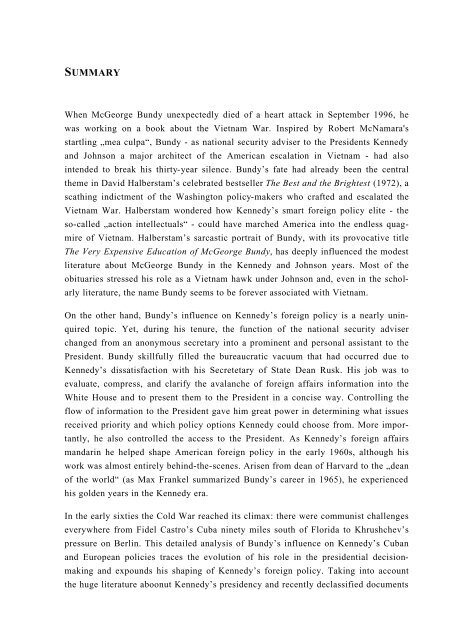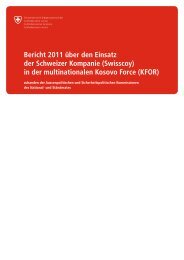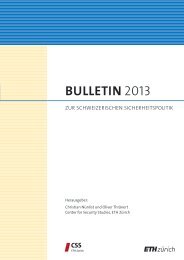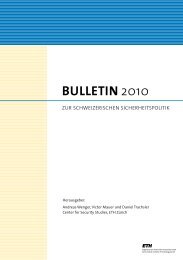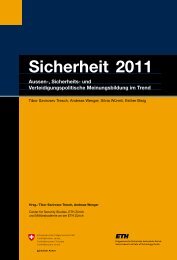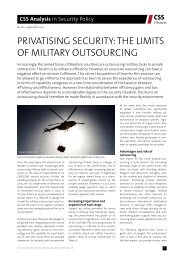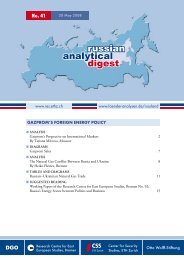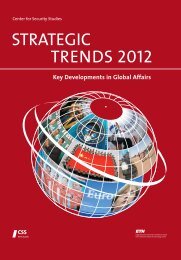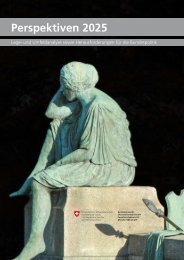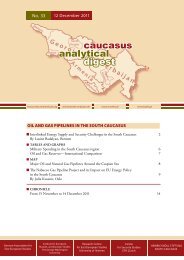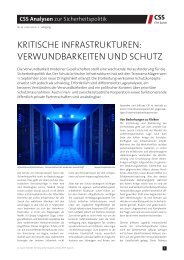German (PDF) - Center for Security Studies (CSS)
German (PDF) - Center for Security Studies (CSS)
German (PDF) - Center for Security Studies (CSS)
Sie wollen auch ein ePaper? Erhöhen Sie die Reichweite Ihrer Titel.
YUMPU macht aus Druck-PDFs automatisch weboptimierte ePaper, die Google liebt.
SUMMARY<br />
When McGeorge Bundy unexpectedly died of a heart attack in September 1996, he<br />
was working on a book about the Vietnam War. Inspired by Robert McNamara's<br />
startling „mea culpa“, Bundy - as national security adviser to the Presidents Kennedy<br />
and Johnson a major architect of the American escalation in Vietnam - had also<br />
intended to break his thirty-year silence. Bundy’s fate had already been the central<br />
theme in David Halberstam’s celebrated bestseller The Best and the Brightest (1972), a<br />
scathing indictment of the Washington policy-makers who crafted and escalated the<br />
Vietnam War. Halberstam wondered how Kennedy’s smart <strong>for</strong>eign policy elite - the<br />
so-called „action intellectuals“ - could have marched America into the endless quagmire<br />
of Vietnam. Halberstam’s sarcastic portrait of Bundy, with its provocative title<br />
The Very Expensive Education of McGeorge Bundy, has deeply influenced the modest<br />
literature about McGeorge Bundy in the Kennedy and Johnson years. Most of the<br />
obituaries stressed his role as a Vietnam hawk under Johnson and, even in the scholarly<br />
literature, the name Bundy seems to be <strong>for</strong>ever associated with Vietnam.<br />
On the other hand, Bundy’s influence on Kennedy’s <strong>for</strong>eign policy is a nearly uninquired<br />
topic. Yet, during his tenure, the function of the national security adviser<br />
changed from an anonymous secretary into a prominent and personal assistant to the<br />
President. Bundy skillfully filled the bureaucratic vacuum that had occurred due to<br />
Kennedy’s dissatisfaction with his Secretetary of State Dean Rusk. His job was to<br />
evaluate, compress, and clarify the avalanche of <strong>for</strong>eign affairs in<strong>for</strong>mation into the<br />
White House and to present them to the President in a concise way. Controlling the<br />
flow of in<strong>for</strong>mation to the President gave him great power in determining what issues<br />
received priority and which policy options Kennedy could choose from. More importantly,<br />
he also controlled the access to the President. As Kennedy’s <strong>for</strong>eign affairs<br />
mandarin he helped shape American <strong>for</strong>eign policy in the early 1960s, although his<br />
work was almost entirely behind-the-scenes. Arisen from dean of Harvard to the „dean<br />
of the world“ (as Max Frankel summarized Bundy’s career in 1965), he experienced<br />
his golden years in the Kennedy era.<br />
In the early sixties the Cold War reached its climax: there were communist challenges<br />
everywhere from Fidel Castro’s Cuba ninety miles south of Florida to Khrushchev’s<br />
pressure on Berlin. This detailed analysis of Bundy’s influence on Kennedy’s Cuban<br />
and European policies traces the evolution of his role in the presidential decisionmaking<br />
and expounds his shaping of Kennedy’s <strong>for</strong>eign policy. Taking into account<br />
the huge literature aboonut Kennedy’s presidency and recently declassified documents


